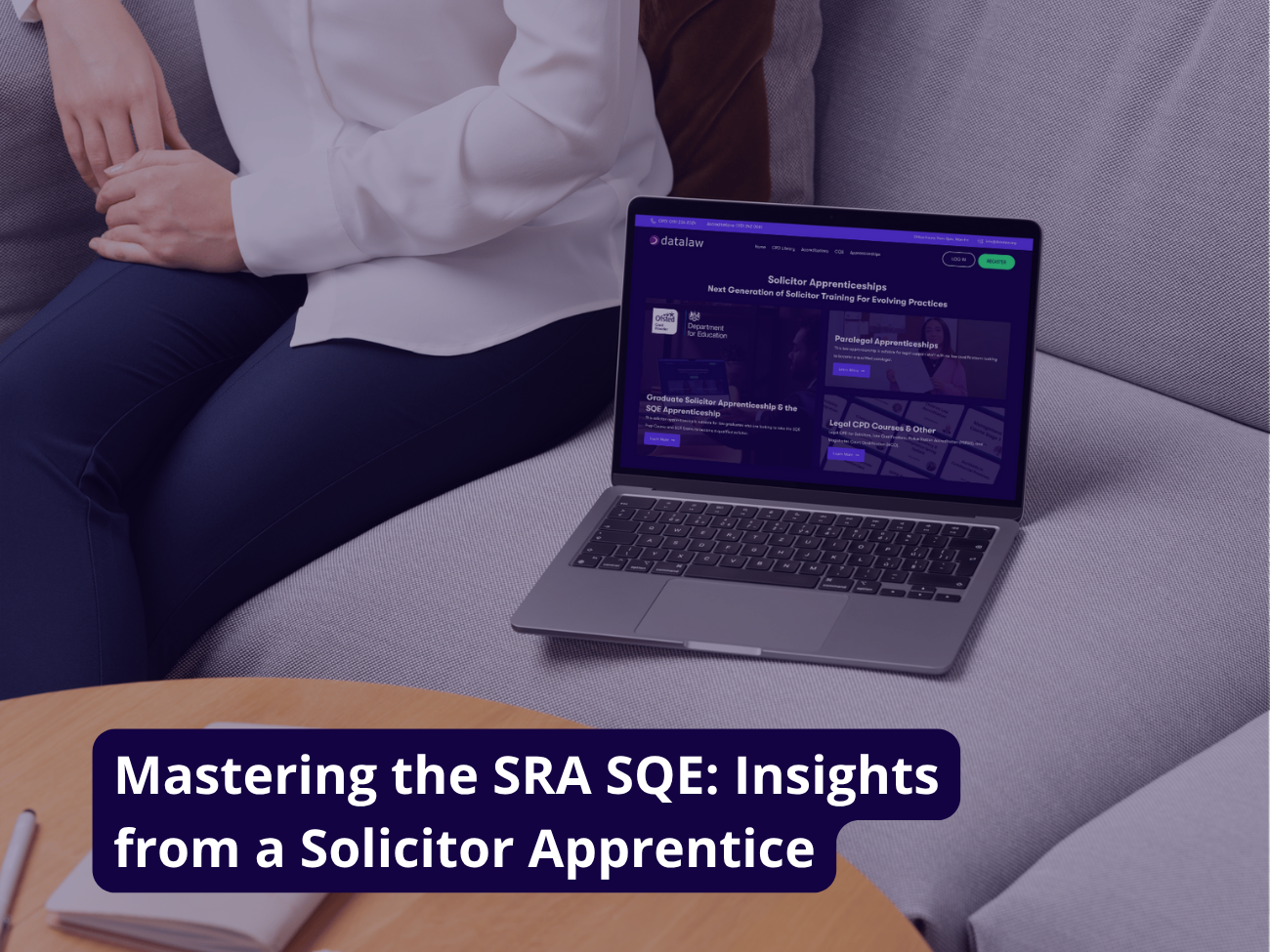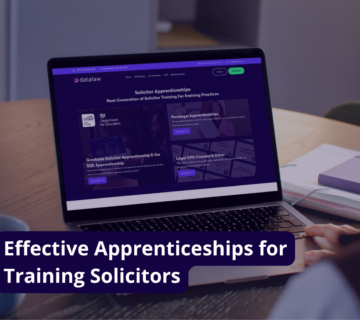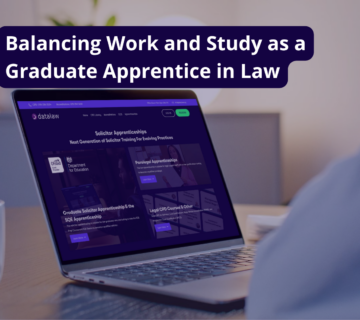The SRA SQE (Solicitors Qualifying Examination) has become the new benchmark for qualifying solicitors in England and Wales. Designed to ensure consistency across the profession, the SQE presents a fresh challenge, one that demands not only strong academic knowledge but also mental resilience, strategy, and the right support systems.
For many aspiring lawyers, the road to qualification can feel daunting. But for solicitor apprentices like Rio Kellman, the SQE is integrated into a structured and supportive journey that blends study with real-world experience. In her testimonial for Datalaw’s Graduate Solicitor Apprenticeship, Rio shares the mindset, strategies, and support systems that are helping her prepare, and thrive.
Download our Free “Graduate Solicitor Apprenticeship” Brochure
The Challenge of the SRA SQE
The SQE is rigorous by design. It tests a broad range of legal knowledge across multiple domains and requires deep understanding, application, and practical legal skills.
“I would prepare anyone for a steep learning curve,” Rio explains candidly. “The SQE covers a broad range of subjects, and it can be quite overwhelming.”
Unlike traditional exams focused on academic theory, the SQE evaluates how well you apply legal principles to real-life scenarios. For apprentices, that means balancing work responsibilities with the pressure of exam preparation, a combination that can be mentally and emotionally demanding.
Don’t Rush: Understand Deeply
One of Rio’s key takeaways is the importance of pacing yourself. With such a wide syllabus, cramming isn’t just ineffective, it’s counterproductive.
“Don’t rush things,” she advises. “Take your time to fully understand each area.”
This methodical approach allows apprentices to retain information long-term and apply it effectively in practice, which is essential not just for passing the SQE but for excelling in the role of a solicitor post-qualification.
Asking Questions Is Key
Rio is quick to remind others that asking for help is not a weakness, it’s a strength.
“Don’t be afraid to ask your mentors and your lecturers questions or to seek clarification until you understand.”
Through Datalaw’s law apprenticeships structure, apprentices are supported by dedicated progress coaches and supervising solicitors, creating a learning environment where questions are encouraged and support is always within reach.
This access to expert guidance is one of the defining features that sets solicitor apprenticeships apart from more self-directed routes to SQE preparation.
Use All the Resources You Can
While apprentices benefit from in-house mentorship and formal training, Rio also highlights the importance of self-directed learning and using supplementary resources.
“There are so many resources available online and provided by Datalaw,” she says. “So don’t hesitate to go out there and look for those extra materials.”
This can include:
- Past paper-style practice questions
- Mock exams
- Video tutorials
- Peer forums and online legal communities
- Workshops and SQE-specific webinars
By combining these resources with practical experience, apprentices get a well-rounded preparation that reinforces both theory and its application in a legal setting.
Balancing Work, Study, and Wellbeing
Preparing for the SQE while working full-time in a legal role is no small task. But for Rio, it’s part of what makes the apprenticeship model so effective.
“It’s working and studying, so it’s a long-term, difficult commitment,” she says. “But you’ll be learning on the job while you’re studying, so it’s crucial to be able to balance both aspects.”
This unique blend of on-the-job training and academic learning not only prepares apprentices for the SQE but also builds the time management, resilience, and focus needed to succeed as a solicitor.
Theory Meets Practice, and Confidence Grows
One of the most powerful aspects of preparing for the SQE through an apprenticeship is the way theory and practice align. Rio describes how her real-world legal experience often reinforces the academic content she’s studying.
“Doing those questions and doing that learning made me feel really confident about how I’m doing at my job,” she explains.
“It reminds me that things are different in practice than they are theoretically, and learning both has really reinforced my knowledge.”
This daily integration of theory into practical tasks makes learning stick, and more importantly, prepares apprentices for what the SQE, and life as a qualified solicitor, will actually look like.
Looking Ahead with Clarity
Rio’s timeline is clearly mapped out: she plans to sit SQE1 in January 2026 and SQE2 in October 2026. With her qualifying work experience (QWE) being completed alongside her apprenticeship, she’ll be ready to qualify as a solicitor immediately after passing the exams, a major advantage of this route.
“I’m manifesting that I’m going to pass first time,” she says with a smile, a testament to the confidence built through a solid support network and structured learning.
Train, Qualify, and Thrive with Datalaw
If you’re serious about passing the SRA SQE and becoming a solicitor, the route you choose matters. With Datalaw’s Graduate Solicitor Apprenticeship, you don’t just prepare for the SQE, you build a career while you do it.
Through a combination of:
- Structured SQE preparation
- One-to-one mentorship from legal professionals
- Paid legal work experience
- Dedicated progress coaching
Datalaw offers a clear and comprehensive pathway to help you succeed in the SQE and step into the legal profession with confidence, clarity, and real-world experience. Ready to explore this streamlined route to qualification? Register your interest and take the first step toward becoming a solicitor.
Discover more of our Legal Updates.



